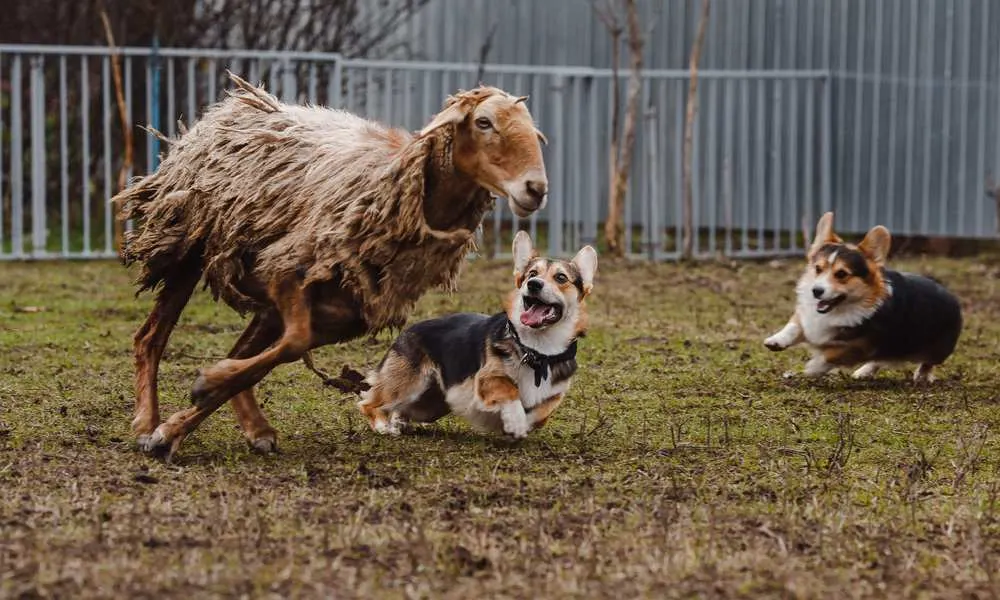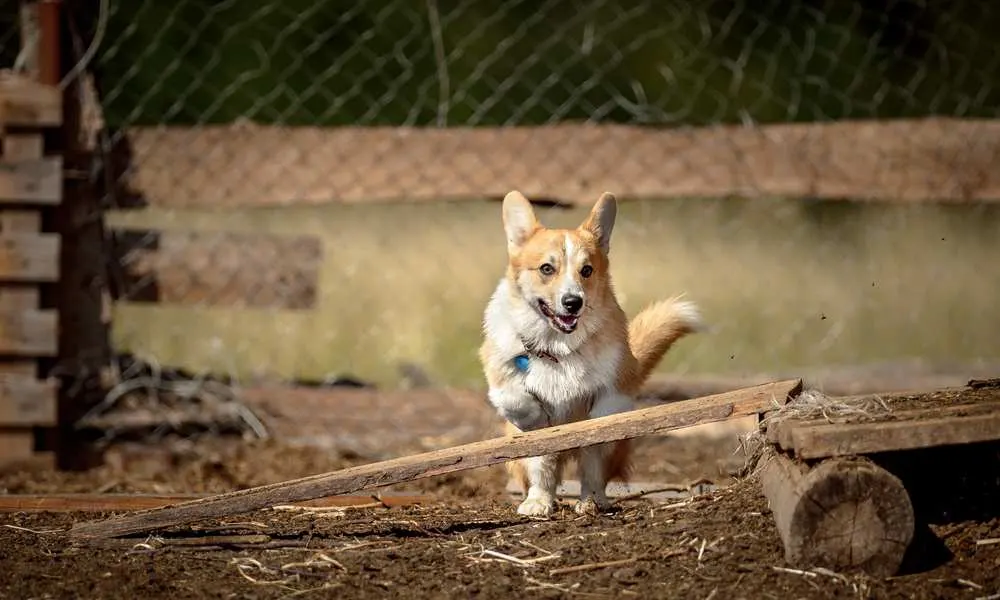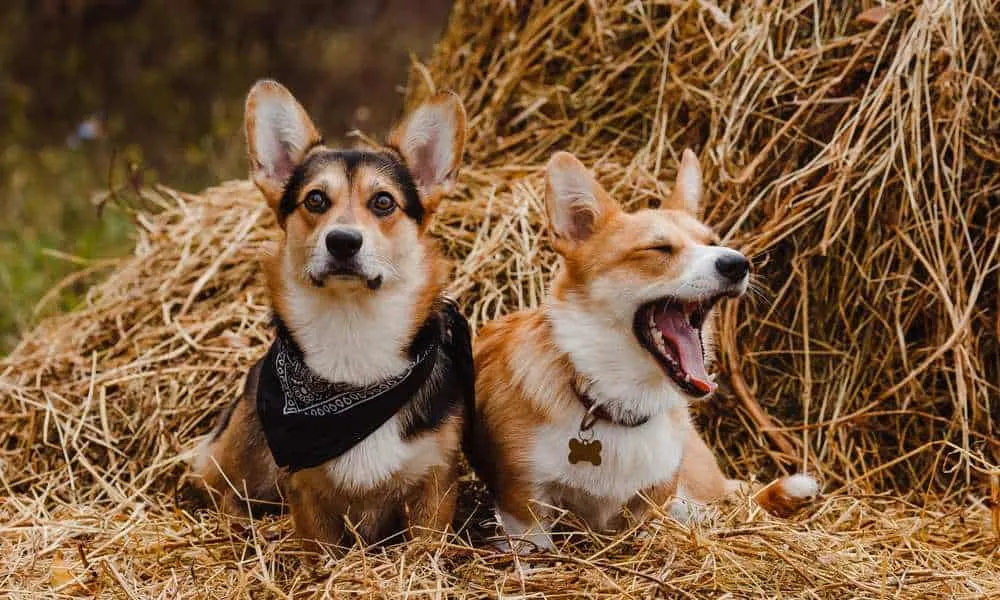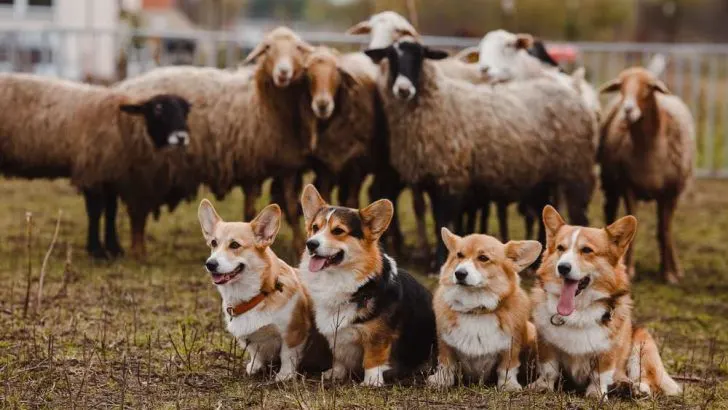When you hear the term farm dog, what pops into your head? Maybe a Border Colie? After all, it’s famous for being the smartest dog in the world! If you do not imagine them, then perhaps a German Shepard? Or a Jack Russel Terrier? There are so many options!
But let’s see if we can get one more name on that list – Corgis! Whether or not you imagined a cute little Corgi when we asked the question depends on your location in the world. Every part of the globe has a preference. In Australia, you’d be shocked to see anything other than an Australian Cattle Dog or Sheppard welcome you on to a farm.
The best place to find a good farm dog, it seems, is the United Kingdom! Do any sort of research on the subject, and you will probably find a couple of breeds that hail from the old island. The already mentioned Border Collie and Jack Russel Terrier are the obvious ones, but there is another.
The Corgi has gained a reputation of being a cute pet that families have running around the house. They also have a reputation of being the dog of choice for Queen Elizabeth II. But there’s more to the little rascals than the red velvet pillows and the fame on social networks. Pembrokes and Cardigans have been the choice of many farmers for thousands of years!
So if all you know about the breed is its reputation for being cute and good-looking, you could be wandering – are Corgis good farm dogs? Well, let’s find out! Come with us as we dive into the history of this lovely breed and figure out whether or not you should get one of your own!

Brief History Of The Corgi
The Corgi is a breed that’s been with us humans for a long time. We’re not exactly sure where they came from, but there are a couple of guesses that have been thrown around over the years. The first Pembrokes are believed to have arrived in Wales around the 10th century. The other guess is that they came in pairs with Nordic settlers.
The second theory seems more likely since there is a popular herding dog in Scandinavia called the Swedish Vallhund. The Corgi and the Vallhund have the exact proportions, and they really look like distant cousins. The Vallhund even has a nickname confirming this – the Wolf Corgi. Because of this, it is believed that they shared the same ancestor.
That may seem like a long time, but the Cardigan Welsh Corgi was brought to the region by Celts over 3000 years ago!
Whatever the truth may be, one thing is certain – they have been working their little butts off since they came here. From the time that settlers started herding cattle until about the 19th century, the Corgi was the Shepard you would see most often on the hills of wales. And they weren’t just herders; the; groups Corgi is a great companion on the farm and quite a guardian. Don’t let their posture fool you; groups of Corgis were sometimes guardian small villages!
Are Corgis Farm Dogs?
So they have a heck of a work ethic, and they’re great guardians. But are corgis farm dogs? Well, they can be. And they were used as farm dogs for a long time! But what about that drop in popularity in the 19th century?
At the end of the 19th century, farmers in Wales started herding sheep instead of cattle. And while this was a good move for them, it wasn’t for the Corgi. Even though they are small dogs, they are actually pretty darn great at herding kettle. Because of that small size, they can nip at the heels of the animals they’re herding. They can run around them quickly too, which helps.
But the Corgi never managed to get on top of sheep herding. This doesn’t mean that the Corgi has been abandoned in its own country, far from it! They were still very much used as farm dogs and guardians. And besides, their popularity was still there; they just switched the field they were working in.
The first time Corgis appeared in a showroom was in 1925. Around this time, the Welsh Corgi Club was formed, and thus begins a new career path for our little friends. The reputation for benign showroom champions stands to this day. The Corgi eventually won many families’ hearts, as people all over the world figured out just how great they are!

Working Class Heroes
Now that we have covered the history, it’s time to take a look at the modern-day Corgi:
If we look back at the last hundred years, we can see the harmful effects of showrooms and selective breeding. There are many breeds that developed severe health conditions that are genetically transferred from generation to generation.
German Shepards, for instance, suffered the most as a breed. Hip Dysplasia, Cancers, and many other health problems now plague these once healthy and beautiful dogs. Fortunately, the Corgi has somehow managed to survive and hang in there with its health relatively intact. There are some health problems that Corgis are known for, but the breed hasn’t changed much in the last century. It turns out they were already showroom-ready!
This means that there isn’t much to worry about, health-wise if you decide to make a Corgi your farmhand. This doesn’t apply to every single Corgi in the world since there’s always a chance of some health problems. But generally, Corgis are healthy and sturdy dogs that have a long lifespan and a lot of energy throughout it.
Still, though, let’s go through some of these possible risks. After all, it’s better to know what to expect, even if we’re talking about the worst-case scenario:
Diabetes / Weight Problems
Like any other breed, Corgis have the risk of becoming diabetic. What makes it even worst is the fact that they have a small body. As diabetes is usually the result of an improper diet, the possible weight gain makes life pretty hard for our little friend.
Those little legs can’t handle the pressure, and it usually ends with joint and hip problems. But this is easily avoided. As long as your Corgi has a balanced and healthy meal plan – everything will be fine.
Degenerative Myelopathy (DM)
Degenerative myelopathy is a condition in which the spinal cord starts to degenerate uncontrollably. It is a genetically inherited condition that has no cure. The symptoms start at the age of 12 and onward. While a devastating disease, it’s known that it causes no pain for the dog.
It is still unclear what exactly causes the condition to start. Breeding dogs that have DM is illegal, but unfortunately, there’s no real way of figuring out that a Corgi has the disease at a young age.
The chances of your dog inheriting DM are not great, but they are present. The condition is deadly, but it’s usually not it that kills but the paralysis. Many people choose to put their dogs down in this situation. The reasoning is that the dog is probably already very old, and euthanasia is the better option when compared to the suffering caused by DM.
What Corgis Are Good At?
So let’s finish up with these history lessons and the health risks. The fact is that Corgis are study and hard-working dogs. But how can a Corgi contribute as a farmhand?
More than you would imagine! We have already mentioned how Corgis are pretty darn good at herding, but that’s not all. Corgis are loud little creatures. You might have been confused as to how a Corgi could guard a whole village. Well, they’re loud!
Corgis are famous barkers. Everyone who’s had one of them knows this. It doesn’t matter if you’re in a house, farm, or apartment. When Corgis see a threat, they bark. Now, we know that that might seem like it could be an annoyance in an apartment building, for instance. And it is an annoyance, trust us. But at a farm, their loud demeanor is more than welcome. It’s actually one of their strengths when they’re herding.
One of the other strengths is that they’re very intelligent and they love to solve problems on their own. They are independent creatures, which is a skill that they had to work on since they were often left alone to work while the humans did what they needed to do. Independence is a heck of an attribute to have on a farm, and we think that it’s one of their most significant traits! We would be lying if we said it’s all sunshine and rainbows, though. Corgis have a bad side, and some people can’t really handle it.
Well, that made it sound a bit dramatic, we admit. But we have to mention the bad things too:
Some would argue that Corgis are independent to a fault. We wouldn’t go that far, but it can be a problem in some situations. Thye can be stubborn because their instincts are telling them to do one thing while you’re saying something else. But it’s far from problematic as far as we are concerned.
Corgis are temperamental when you don’t put in the work that’s needed for proper obedience training. But all of this is easily avoidable, and it depends on the owner, not the dog. What we mean is that you just need to learn about Corgis and what they are like. This way, you will know why they are doing something that may seem irrational.
But the thing is, that’s something we can say about all dogs! Sure, Corgis can be stubborn, but they are very intelligent! But more on that in a moment.
The last thing we have to mention as an advantage in Corgis is their ability to adapt to different weather conditions. The Corgi has that double-coated body for a reason. Wales may not be the harshest place on earth. But if you are a small dog on an open windy field, you’ll experience a little more harshest than the average joe. But wales is also famous for having all four seasons pretty well represented during the year.
After a couple of thousands of years of adapting to such weather, and we got ourselves a dog that can live pretty much anywhere!
Sure, if your farm is in the middle of Siberia, your Corgi might need a winter coat. But if you have a farm in the middle of Siberia, you have bigger problems than your dog feeling chilly.

Corgi Intelligence
When talking about Canine intelligence, it’s impossible not to mention the 1994 book “The Intelligence Of Dogs”. In it, professor Stanley Coren, a canine psychologist, researched the differences in intelligence between different dog breeds.
We mention it now because it is still the best and most quoted research on the subject. The second edition came out in 2006, but there was minimal difference between the two types of research.
In his book, professor Coren created a list in which he ranked dog breeds based on his test results. Let’s take a look at how our favorite breed is managed!
Brightest Dogs
The Brightest Dogs are the ones that:
- Understand new commands in under 5 repetitions
- Obey the first command 95% of the time (or better)
| 1. | Border Collie |
| 2. | Poodle |
| 3. | German Shepherd |
| 4. | Golden Retriever |
| 5. | Doberman Pinscher |
| 6. | Shetland Sheepdog |
| 7. | Labrador Retriever |
| 8. | Papillon |
| 9. | Rottweiler |
| 10. | Australian Cattle Dog |
Excellent Working Dogs
Excellent working dogs are the ones that:
- Understand new commands in under 15 repetitions
- Obey the first command 85% of the time (or better)
| 11. | Pembroke Welsh Corgi |
| 12. | Miniature Schnauzer |
| 13. | English Springer Spaniel |
| 14. | Belgian Shepherd Dog (Tervuren) |
| 15. | Schipperke |
| 16. | Belgian Sheepdog |
| 17. | Collie |
| 18. | Keeshond |
| 19. | German Shorthaired Pointer |
| 20. | Flat-Coated Retriever |
| 21. | English Cocker Spaniel |
| 22. | Standard Schnauzer |
| 23. | Brittany |
| 24. | Cocker Spaniel |
| 25. | Weimaraner |
| 26. | Belgian Malinois |
| 27. | Bernese Mountain Dog |
| 28. | Pomeranian |
| 29. | Irish Water Spaniel |
| 30. | Vizsla |
| 31. | Cardigan Welsh Corgi |
So, what can we spot in this list? Well, unfortunately, neither of the Corgis cracked the top ten. But while they don’t belong on the Brightest Dogs list, both the Pembroke and the Cardigan are on the Excellent Working Dogs list.
Not to brag, but that’s still a pretty darn elite list. The Cardigan is almost on the next one, but they’re hanging on. This further shows how different these two Corgis are. They have a common ancestor, yes, but their evolution has been quite different. But still, as far as having a dog on a farm goes, Corgis have it down. That’s literally what they’ve been doing their whole life.
Corgis can compete in dog agility and obedience trials. They are also great at flyball, tracking, and herding events. The point of this all is to show you that they really are very smart dogs. And, while canine intelligence depends entirely on the owner, it helps to know that they’re ready for a challenge.
But with big brains comes independence. They won’t find a job and move out after high school, but they know what they’re doing, which means that they sometimes think they know better. But we can’t stress enough; this is something that’s easily resolved. If you give them a chance, Corgis are loyal, hard workers.

Are Corgis Good Farm Dogs?
So what’s the final verdict?
Are Corgis good farm dogs? Well, as far as we can see, they’re smart, they’ve been farmers for about a couple of thousand years and they’re loyal. Absolutely! Our little friends have been doing their jobs for as long as we knew them. The choice between the Pembroke and the Cardigan is still up to you, though.
The differences are not obvious at first. But the Pembroke is smarter (on paper at least), which means that it tends to be a bit more stubborn. It’s just their nature. The Cardigan can be annoying too, but we can assure you, they are both loyal companions. Besides, the Cardigan has been farming for about three thousand years longer than you. Even if it is stubborn and independent, it still knows what it’s doing.
All the things that we mentioned, the drawbacks of the Corgi, if you will, are there as a warning and nothing else. We feel obligated to give you all the info you might need to make a decision. Getting any dog to be your comrade on the farm is going to be great. But getting a Corgi will be just a tad better.
Read Also: Can Corgis Stay Outside?

Final Words
That’s pretty much all you need to know about the little workers. Corgis are our favorite breed, but we managed to stay objective here, we think.
All in all, we always recommend them for any situation. Sure they can be loud and stubborn in the house, but a farm? We have no doubt that Corgis will give you all you need from a worker, and then some!
Get a Pembroke or a Cardigan, it doesn’t matter; a Corgi is a Corgi. So ask around, find a proper Corgi breeder, and get your farm a real little working machine!

